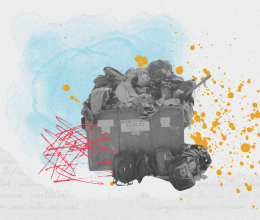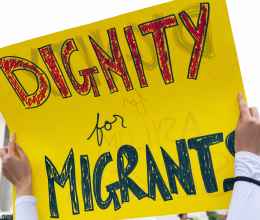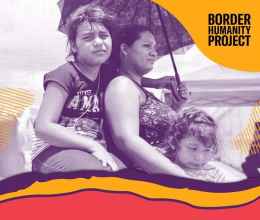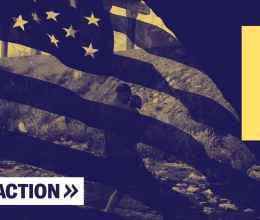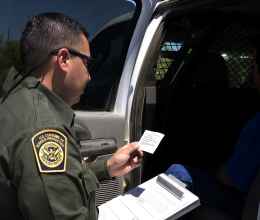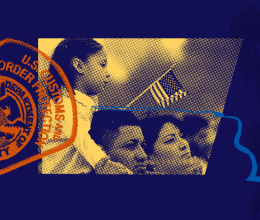
FOR IMMEDIATE RELEASE
TUCSON, Ariz.—Two southern Arizona residents filed a federal lawsuit today challenging U.S. Border Patrol’s obstruction of their efforts to monitor an interior checkpoint near the town of Arivaca.
In the lawsuit filed in U.S. District Court in Tucson, plaintiffs Peter Ragan and Leesa Jacobson assert that Border Patrol agents have infringed and restricted their First Amendment rights by harassing, intimidating, retaliating against and threatening them with arrest for engaging in constitutionally protected speech. Mr. Ragan and Ms. Jacobson are members of People Helping People, a community group that has been attempting to observe, photograph and video record the actions of Border Patrol agents at the checkpoint on Arivaca Road in Amado, Ariz. Over the past year, in response to recurring reports of abuse by agents, the group has monitored the checkpoint from an adjacent public right-of-way.
The Arivaca Road checkpoint has been in operation for about seven years—despite being officially designated as a temporary operation—and is one of four interior Border Patrol checkpoints within 30 miles of Arivaca. Many Arivaca residents must pass through the checkpoints daily to go to work, school, or to run basic errands.
“Arivaca residents have to drive through this checkpoint every day, and every time they have to answer to an armed federal agent,” Jacobson said. “That’s not how this country is supposed to work, but as long as the checkpoint is here I want to do everything I can to document abuses and protest the ongoing militarization of our communities and the border region.”
In response to the checkpoint monitoring campaign, Border Patrol agents have erected barriers that restrict how close the People Helping People observers can be to the checkpoint, parked vehicles in the monitors’ line of sight, and threatened the monitors with arrest.
“They’ve cordoned us off far away from the checkpoint, parked their trucks to block our view and even threatened to arrest us,” Ragan said. “All of this is on top of the harassment and abuse community members were already experiencing at this checkpoint, which necessitated this campaign in the first place. Instead of responding to our concerns, by imposing these restrictions Border Patrol is doubling down on abuse and retaliating against community members who are just trying to hold them accountable.”
Many Arivaca residents have reported civil liberties violations at the Arivaca Road checkpoint, including prolonged interrogation and detention, invasive searches, false alerts by drug-sniffing dogs, racial profiling, verbal harassment and physical assault. Border Patrol refused to share information about the checkpoint or respond to residents’ complaints of abuse, compelling Ragan, Jacobson and other volunteers to document agents’ interactions with motorists.
People Helping People recently released initial findings from its monitoring efforts. Data collected from over 100 hours of monitoring and 2,700 checkpoint stops showed that agents at the Arivaca Road checkpoint systematically discriminate against Latino motorists.
“There couldn’t be a clearer demonstration of Border Patrol’s lack of transparency than literally preventing members of this community from observing the actions of agents in their own town,” ACLU of Arizona attorney James Lyall said. “Border Patrol has paid lip service to transparency and accountability, but our clients’ experience shows the agency’s promised reforms have yet to become a reality for border residents. Fortunately, people like Peter and Leesa are fighting to ensure the nation’s largest federal law enforcement agency is held accountable.”
Ragan and Jacobson are seeking a judicial order preventing Border Patrol from interfering with their monitoring campaign.
“There is a clear First Amendment right for residents to monitor and protest local law enforcement operations such as the Arivaca checkpoint, as confirmed by courts in the Ninth Circuit and across the country,” said Winslow Taub of Covington & Burling LLP. “That right is particularly important here, where the law enforcement activity being monitored raises other serious constitutional privacy and discrimination questions.”
In addition to the ACLU of Arizona’s Lyall and Covington & Burling LLP’s Taub, attorneys for Ragan and Jacobson include Dan Pochoda, Victoria Lopez and Joel Edman of the ACLU of Arizona; David Loy and Mitra Ebadolahi of the ACLU of San Diego and Imperial Counties; and Tracy Ebanks, Christina Dashe and Ethan Forrest of Covington & Burling LLP.
Visit HERE for more information about the ACLU’s work related to U.S. Border Patrol checkpoints.
###
